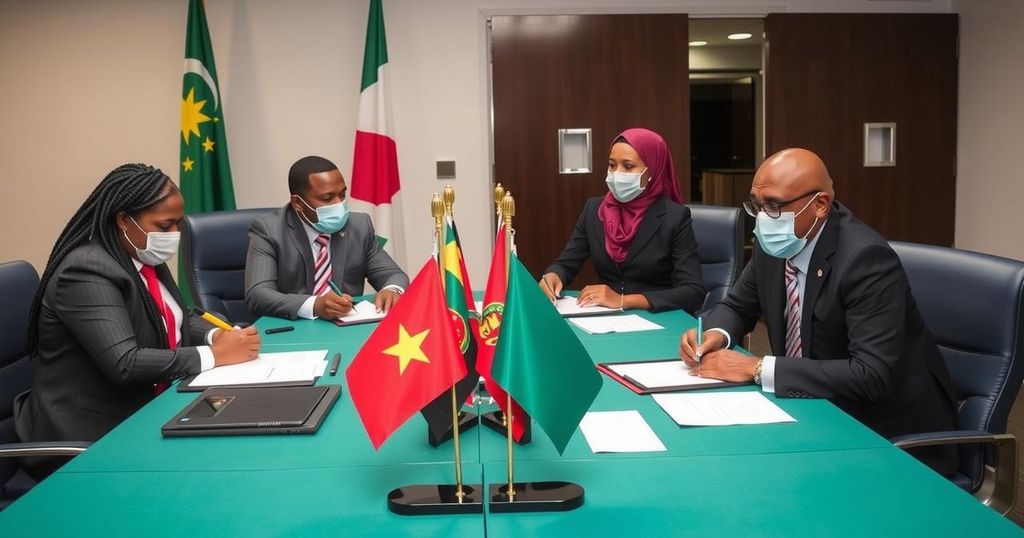Somalia’s Diplomatic Mission to Strengthen Commitments Under the Ankara Agreement

On December 14, 2017, Somalia’s Minister of Foreign Affairs led a delegation to Addis Ababa to reinforce the Ankara Agreement, signed on December 2, 2017. The agreement emphasizes bilateral cooperation, granting Ethiopia maritime access, and fostering peace in the Horn of Africa. The meeting reflects both nations’ commitment to mutual respect and evolving regional relationships, gaining international support for stability and economic cooperation.
On December 14, 2017, a delegation led by Ali Omar, Somalia’s Minister of Foreign Affairs and International Cooperation, arrived in Addis Ababa. The primary objective of this visit was to enhance the commitments outlined in the historic Ankara Agreement, signed on December 2, 2017, between Ethiopian Prime Minister Abiy Ahmed and Somali President Hassan Sheikh Mohamud. The agreement underscores the dedication of Somalia and Ethiopia to strengthen bilateral relations and promote regional stability.
The Ankara Agreement is a significant achievement in fostering peace and cooperation in the Horn of Africa. It includes crucial provisions granting Ethiopia access to a reliable maritime passage, under Somalia’s sovereign authority, addressing the needs of landlocked Ethiopia for trade and economic growth. Prime Minister Abiy Ahmed emphasized the peaceful nature of Ethiopia’s aspirations, insisting that they serve mutual interests rather than create suspicion.
The visiting delegation further aims to solidify ongoing cooperation between Ethiopia and Somalia, driven by mutual respect and shared goals. Somalian authorities reiterated their commitment to fostering strong regional ties founded on sovereignty, signifying a collective move towards overcoming past disputes, including tensions related to Ethiopia’s agreements with Somaliland. Such constructive dialogue represents a prioritization of peace and shared growth.
The Ankara Agreement encompasses several vital components: mutual respect for sovereignty and territorial integrity, the establishment of a constructive partnership despite historical differences, acknowledgment of sacrifices, reliable maritime access for Ethiopia, agreement on technical negotiations, and the acceptance of Turkey’s role in mediating disputes. Collectively, these elements highlight a strategic commitment to resolve issues peacefully while simultaneously enhancing international collaboration within the region.
Notably, international support for Ethiopia’s quest for a maritime passage has been vocalized by leaders such as French President Emmanuel Macron, indicating a broader consensus on the importance of stability and economic potential in the Horn of Africa. The successful implementation of the Ankara Agreement symbolizes a transformative moment for Somalia and Ethiopia, presenting a framework for future regional cooperation and economic integration.
The Ankara Agreement represents a landmark initiative aimed at fostering cooperation and peace between Ethiopia and Somalia, two nations located in the Horn of Africa. This area has faced long-standing tensions and conflicts, particularly over territorial issues, trade disputes, and historical grievances. The agreement serves as a foundational step towards Mending relations through mutual respect and collaborative efforts to address shared challenges. With Ethiopia being landlocked, the need for maritime access is particularly critical for its economic development, making this diplomatic engagement vital for both nations.
In summary, the visit of the Somali delegation to Addis Ababa marks a pivotal moment in strengthening the commitments of the Ankara Agreement. By reaffirming their dedication to mutual respect, peaceful dispute resolution, and economic cooperation, Ethiopia and Somalia are laying the groundwork for a more stable and prosperous future in the Horn of Africa. The international community’s support further reinforces the significance of this agreement as a model for fostering regional collaboration.
Original Source: addisinsight.net








